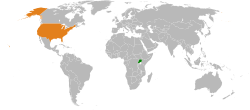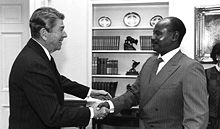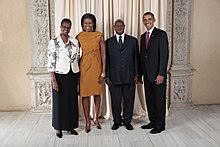Uganda–United States relations
 | |
Uganda |
United States |
|---|---|
Uganda – United States relations are bilateral diplomatic, economic, social and political relations between Uganda and the United States.
According to the 2012 U.S. Global Leadership Report, 79% of
Overview

Although U.S.–Ugandan relations were strained during the rule of
Bilateral relations between the United States and Uganda have been good since

U.S. development assistance in Uganda has the overall goal of reducing mass
U.S.
U.S.-Ugandan relations also benefit from significant contributions to health care,
Principal U.S. Officials include Ambassador William W. Popp.[2]
The U.S. maintains an embassy in Kampala, Uganda.

Relations between the two countries have recently been shaken when, on June 19, 2014, the Obama administration cut funding to Uganda in addition to canceling a planned military exercise with their armed forces in response to Uganda's outlawing of homosexuality that February, which had already been met with worldwide condemnation, especially from the Western world. On June 20, the Ugandan government accused the U.S. of "blackmail".[3]
Relations were similarly shaken in May 2023 after the
See also
- Ugandan Americans
- Foreign relations of Uganda
- Foreign relations of the United States
- Southeast Africans in the United States
References
- Gallup
- ^ "Key Officers (copy) | Embassy of the United States". Archived from the original on 2014-03-07.
- ^ "Uganda Says US Gay Penalties are 'Blackmail'". Voice of America. 20 June 2014. Retrieved 20 June 2014.
![]() This article incorporates public domain material from U.S. Bilateral Relations Fact Sheets. United States Department of State.
This article incorporates public domain material from U.S. Bilateral Relations Fact Sheets. United States Department of State.
Further reading
- Miller, Olivia. "Ugandan Americans." Gale Encyclopedia of Multicultural America, edited by Thomas Riggs, (3rd ed., vol. 4, Gale, 2014), pp. 449–458. online
External links
![]() Media related to Relations of Uganda and the United States at Wikimedia Commons
Media related to Relations of Uganda and the United States at Wikimedia Commons

